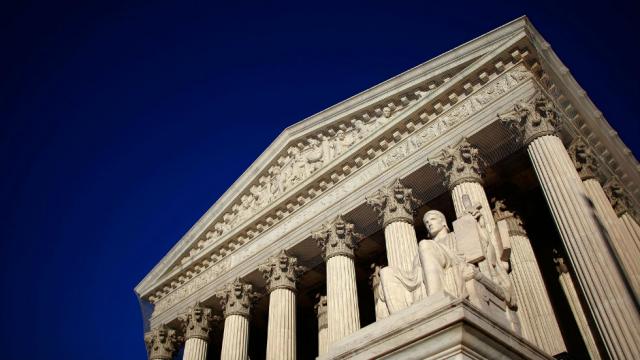Supreme Court to review workplace dispute over free speech and gay marriage

Lorie Smith, a business owner, says that she values her Christian faith more than financial profit.
Smith’s efforts to manage them both have led her into conflict with Colorado officials about workplace speech limits. This issue will be addressed by the Supreme Court in high-profile oral arguments Monday.
The issue is the refusal of a private company to create a website for a same-sex marriage, despite a law in the state prohibiting discrimination based on sexual orientation.
The nine-member bench will be again faced with legal questions about compelled commercial speech, expressive material and societal tolerance. There are also competing claims regarding religion and gay rights.
|
Smith is the founder of 303 Creative, an online graphic design company that is for-profit. She hopes to expand her portfolio to include wedding celebration websites.
She does not want any sites for lesbian or gay couples to be published, as it is against her religious beliefs. Smith claims that she will be prohibited from publishing a disclaimer about these views on her homepage.
Smith stated that no one should be punished, compelled or silenced just because they believe differently to the government.
Supporters of the law argue that it is necessary, particularly after 2015’s high court ruling that allowed same-sex marriage.
“If 303 Creative prevails, then any business that is expressive, which is a lot of businesses can start putting up signs that say no Jews served or Christians served, and no Blacks served,” stated David Cole, ACLU National Legal Director. “We had that practice in Jim Crow. I don’t think that we want it back.”
The court will not specifically address whether the Colorado law violates artist’s religious freedom to exercise it freely. The justices will consider the constitutionality of the law in part based on the underlying faith-based claims.
This case is one of a number of First Amendment cases that have religious connotations. The court’s conservative majority has reacted to these cases in recent years.
It is also the second time that the Colorado law will be subject to high court scrutiny. Jack Phillips, the owner of Masterpiece Cakeshop, refused to make a custom wedding cake for a Lakewood couple. 2018’s ruling by the justices gave the baker partial victory. It stated that the Colorado Civil Rights Commission had been biased against gay couples.
The Supreme Court might now be willing to give a wider opinion about the constitutional rights enjoyed nationwide by private business owners.
Smith’s story
Smith stated that her passion for graphic design started at the age of five, when she was able to watch her mother run her boutique.
Smith said that Smith had the unique opportunity to be in that environment and see firsthand what it is like to own and run a business.
Smith described her love for the process of getting acquainted with clients before creating. I take the time to get to know my clients. I want to find out what my clients are passionate about and why they have asked me to help. Is this a good match? Are they looking for something I can do? Do I feel passionate about it?
After many years working in corporate design and marketing, she opened her own studio named after the “303” zip code of Denver.
Smith admits she loves the personal touch that she can give clients but cannot deliver every message they might want. Smith believes marriage is the union between one man and one woman according to her Christian faith. She says that her custom websites would celebrate marriage within her traditional beliefs.
Smith is concerned about being sanctioned by Colorado if she expresses her views on 303Creative.com. She also filed a pre-enforcement complaint against Colorado’s law. A sample page that has not been published would state that creating same-sex marriage websites “would compromise my Christian witness” and that it would tell a story about the marriage that is contrary to God’s true story, which He is calling me too promote.
She would also refuse to design content that promotes atheism, gambling, or violence.
Alliance Defending Freedom, based in Arizona, represents Smith in court and did the same with Phillips in his appeal.
303 Creative has provided services to LGBTQ+ clients. Smith claims her lawsuit isn’t about gay marriage or gay customers. She asserts her right not to express her ideas via websites that challenge deeply-held religious beliefs.
It certainly rocked my world. She said, “It certainly rocked me. “I understand that not everyone holds the same views on marriage as me, and that’s okay. What I’m asking the court is to protect those peoples’ rights as well. To ensure their freedom to think and communicate freely.
Arguments from Colorado
Officials from the state claim that the Colorado Anti-Discrimination Act is being applied fairly to all business. It makes it illegal to refuse public service based on “disability”, race, creed or color, marital status, nationality, or ancestry.
“Companies can’t turn away LGBT customers simply because they are gay,” stated Phil Weiser, a Colorado Democrat who was just reelected. “We will vigorously defend Colorado’s law which protects all Coloradans through preventing discrimination, and upholding freedom of speech.”
Much of the oral argument is expected to turn on what Smith would be allowed to digitally publish, and whether it amounts to constitutionally-protected viewpoints or instead, is the kind of conduct the government may regulate.
The state argued that its law was about equal access and did not seek to suppress any message Smith or his business may wish to send in its brief to the high court.
According to Colorado officials, “The Company can choose what design services it offers and whether or not to communicate its vision for marriage through biblical quotations on its wedding websites.” “The Act only requires that the Company offer any product or service to all customers, regardless of their protected characteristics.”
“Over many decades and in the face of many challenges, this Supreme Court has repeatedly confirmed that the state can prevent ordinary sales discrimination. This important, long-standing principle should not be abandoned.
CADA has been upheld by lower courts, stating that the state has compelling grounds to protect the “dignity” i.










No Comments